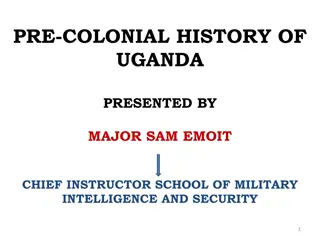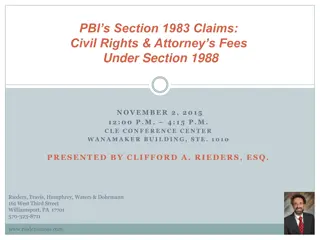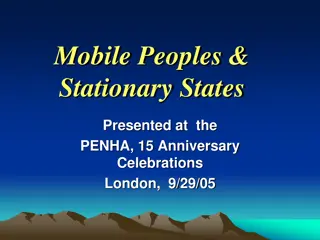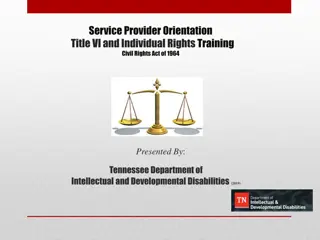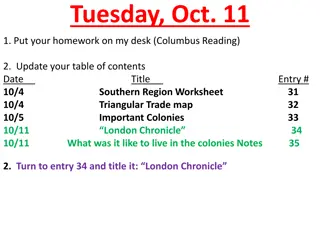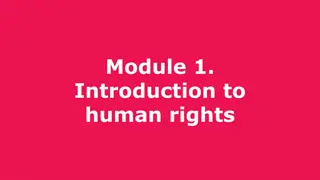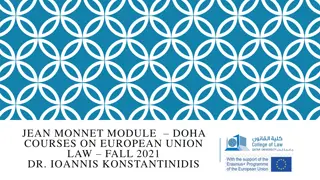Approaches to the study of Human Rights
The Marxist perspective on human rights emphasizes social rights over individual rights, viewing the full realization of self within society. Marx connects bourgeois society with human rights, highlighting how exploitation under capitalism alienates individuals. In contrast, the Third World perspect
5 views • 19 slides
Colonial Acts and Conflicts in American History
Key historical events such as the French & Indian War, the Proclamation of 1763, and the Quartering Act are explored, shedding light on critical laws, conflicts, and tensions that shaped colonial America. The discussion covers acts imposed by the British government, the impact on settlers and Native
5 views • 15 slides
Promoting Children's Rights in Education for Scotland's Learners
Raise awareness about Children's Rights, the United Nations Convention on the Rights of the Child, and how to embed them in education. Explore the importance of developing a culture that upholds rights-based practices and supports children in claiming their rights. Reflect on professional standards
1 views • 26 slides
Architecture in Colonial India: A Blend of Cultures
British Colonial architecture in India during the 17th to 20th centuries combined Hindu, Islamic, and Western elements, leading to the unique Indo-Saracenic style. This architectural era saw the construction of institutional and civic buildings showcasing a mix of Gothic, Neo-Classical, Indo-Islamic
0 views • 9 slides
Understanding Human Rights: Overview and Evolution
Human rights encompass various aspects such as human needs, generations of rights, individual status, and the indivisibility of rights. Dr. Anna Ledzi ska-Simon discusses the translation of human needs into rights, the historical evolution of rights across generations, individual rights according to
3 views • 17 slides
Understanding Human Rights in Queensland Government Work
The Human Rights Act of 2019 in Queensland outlines protected rights such as equality, freedom of expression, and fair trial. All public service employees must adhere to these rights, ensuring decisions and actions respect human rights. This act applies to everyone in the Queensland Government, with
2 views • 13 slides
Evolution of Medicine in Colonial South Asia
The evolution of medicine in colonial South Asia witnessed a transition from local traditional practices to the dominance of imported European medicine. This shift, marked by the establishment of imperial institutions and training of local physicians in Western techniques, led to a complex interplay
1 views • 5 slides
Understanding the Basic Concept of Human Rights in Modern Jurisprudence
Human rights are natural and inalienable, essential for human life, based on universal principles. The concept of human rights is both simple and complex, requiring societal development and political will for implementation. Rooted in natural law theory, human rights have evolved from natural law to
1 views • 24 slides
Language Controversy and Political Awakening in Colonial India
Urdu-Hindi language controversy in colonial India sparked a significant cultural and political divide between Hindus and Muslims, leading to the emergence of the Two-Nation Theory. This controversy, along with events like the formation of the Indian National Conference, highlighted growing tensions
0 views • 45 slides
Test Your Knowledge: The Big Children's Rights Quiz
Test your knowledge of children's rights with "The Big Children's Rights Quiz." The quiz includes true or false questions related to the United Nations Convention on the Rights of the Child, government responsibilities, the importance of rights, and the concept of Duty Bearers. Explore these thought
0 views • 24 slides
Understanding Uganda's Pre-Colonial History through Major Sam Emoit's Presentation
Delve into the pre-colonial history of Uganda as presented by Major Sam Emoit, Chief Instructor at the School of Military Intelligence and Security. Explore the way ancestral Ugandan communities lived, their tools, social patterns, and interactions before colonial rule. Discover the diverse methods
0 views • 127 slides
Legal Rights and Options for Regional Center Clients in California
This document discusses the legal rights and options available for adult regional center clients in California, focusing on clarifying their rights, reviewing support systems, exploring alternatives to conservatorship, and explaining the conservatorship process. It also covers children's and adults'
1 views • 35 slides
Reflection on Human Rights and Criminals
Explore the complex question of whether criminals should have human rights, delving into the distinctions between absolute and non-absolute rights, and the impact of child labor on human rights. Consider the removal of certain rights from criminals and engage in critical thinking exercises regarding
1 views • 19 slides
Evolution of Colonial Architecture in British India
The British Colonial era in India spanned over three centuries from 1615 to 1947, leaving a lasting impact on the country's architecture. The fusion of Hindu, Islamic, and Western elements gave rise to the distinctive Indo-Saracenic style, showcased in various institutional and civic structures. Exp
0 views • 16 slides
Civil Rights Training Overview for SMP Participants
This civil rights training presentation covers the goals of civil rights, discrimination, protected classes, examples of discrimination, components of civil rights compliance, and the importance of equal access for all participants in the SMP program. It emphasizes equal treatment, knowledge of righ
0 views • 36 slides
Challenges and Progress in 1920s American Civil Rights Movement
The 1920s in America saw significant changes in civil rights, women's movement, and prohibition. Civil rights encompass personal freedoms guaranteed by the U.S. Constitution, including freedom of speech, voting rights, and protection from discrimination. Violations of civil rights have occurred thro
1 views • 42 slides
Understanding Section 1983 Claims and Civil Rights Attorney Fees
Section 1983 of the Civil Rights Act allows individuals to seek redress for violations of their constitutional rights by persons acting under state law. This provision does not create new rights but provides remedies for existing rights. The history of Section 1983 dates back to 1871 and has been in
0 views • 27 slides
Welcome to Colonial Cafe Orientation
Explore the comprehensive orientation agenda at Colonial Cafe, covering essential topics such as company history, mission, job expectations, benefits, and training. Learn about the Cherry System, growth opportunities, and the company's commitment to providing excellent service and quality food. Get
0 views • 28 slides
Understanding Colonialism and Imperialism in Modern History
The discussion revolves around the impact of colonialism and imperialism on international relations, focusing on the historical context, economic consequences, and nationalist movements against colonial powers. Highlighting key players such as Great Britain, France, and Germany during the 19th centu
2 views • 14 slides
American Colonial History and Representative Government Study Guide
Study guide for American colonial history and representative government covering topics such as Colonial Culture, the Great Awakening/Enlightenment, Ben Franklin, and Roots of Representative Government including Magna Carta, Parliament, English Bill of Rights, Glorious Revolution, salutary neglect,
0 views • 4 slides
Colonial Culture and The Great Awakening: Overview and Impact
This content covers activities and notes related to Colonial Culture, Native Americans, Colonists, and the African American community. It also delves into the Great Awakening and Enlightenment period, discussing the religious movement in the 1730s-1740s. Traveling ministers, such as Jonathan Edwards
0 views • 13 slides
Liberal Democracy and Citizenship: Rights, Duties, and Participation
Citizenship in liberal democracies entails equal rights, duties, liberties, and constraints, with a focus on civil and political rights. The entrenchment of these rights has been key in establishing popular sovereignty and individual autonomy. Civil rights, developed in the 18th century, centered on
2 views • 16 slides
Evolution of Human Rights: From Ancient Times to Modern Era
Throughout history, ideas of rights and liberty have evolved, leading to the recognition of universal human rights in the modern sense. The concept of human rights can be traced back to significant historical events such as the English Bill of Rights, the Virginia Declaration of 1776, and the French
0 views • 7 slides
Understanding Citizenship and Immigration in Modern Democracies
Citizenship, a fundamental institution of modern democracies, defines the relationship between individuals and the state through reciprocal rights and duties. However, citizenship has a dual nature, serving to both include certain individuals as citizens and exclude others. Immigrants residing withi
0 views • 21 slides
Human Rights and Citizenship Rights in Leisure, Sport, and Tourism: A Historical Perspective
This text delves into the intersection of human rights, citizenship rights, and leisure activities like sports and tourism. It explores the definitions, history, and declarations related to human rights, emphasizing the importance of allowing individuals the freedom to pursue leisure activities with
0 views • 20 slides
Understanding Residents Rights in Nursing Homes
Residents of nursing homes have additional rights beyond their rights as U.S. citizens. These rights, protected by federal law, ensure that residents are treated with dignity, have self-determination, make choices, receive information, and have access to communication and services. Exercising these
0 views • 40 slides
Overview of International Human Rights Law and Treaties
This comprehensive overview delves into the foundations of international human rights law, exploring key documents such as the Universal Declaration of Human Rights, the International Bill of Rights, and various human rights treaties addressing discrimination, women's rights, children's rights, migr
0 views • 27 slides
European Colonial Encounters 1750-1914: Paths to Imperialism
Second wave European conquests in the 18th and 19th centuries saw a shift towards informal control and military force in establishing empires in Africa and Asia. Various paths to colonial status emerged in India, Indonesia, Australia, and New Zealand, reflecting different colonization methods and ou
0 views • 21 slides
The Crisis Begins: Impact of the Stamp Act and Colonial Resistance
The Crisis Begins Chapter from "Give Me Liberty!" discusses the repercussions of the 7 Years War and the end of salutary neglect, leading to new trade regulations and increased taxation on colonists. The imposition of the Stamp Act without colonial consent sparked widespread resistance, with the eme
0 views • 14 slides
European Colonial Competition in East Africa
The division of African territories by European powers, such as Britain, France, and Italy, led to conflicts and negotiations in the Horn of Africa. Menelik, an African leader, challenged European colonialists, resulting in the famous Battle of Adwa. The aftermath of the battle saw a shift towards n
0 views • 25 slides
Colonial Rebellions and Reactions in Early America
The Colonial Rebellions in early America, such as Bacon's Rebellion and the Stono Rebellion, exemplified the growing tensions and conflicts within the colonial society. These uprisings highlighted issues of class struggle, disparity in social status, and led to significant consequences such as the f
0 views • 7 slides
The Remarkable Journey of Robert Clive: From Clerk to Governor in Colonial India
Robert Clive, known for his military prowess and statesmanship, rose from a humble clerk to a significant figure in the British East India Company. His strategic victories in battles like Arcot, Plassey, and Buxar shaped British colonial rule in India. As a statesman, he implemented civil reforms an
0 views • 4 slides
The Significance of Human Rights in the Modern World
Human rights are fundamental rights that belong to all individuals, are inalienable, indivisible, interconnected, and should be respected without prejudice. The Universal Declaration of Human Rights, adopted in 1948 after WWII by the United Nations, is a crucial milestone document emphasizing human
0 views • 5 slides
Colonial Challenges Under British Rule
In this academic material, students are instructed to update the Table of Contents and engage with resources related to tighter British control over the colonies. The tasks include exploring historical events like the Proclamation Act of 1763, Quartering Act, Sugar Act, Stamp Act, Declaratory Act, a
0 views • 18 slides
Enhancing Transparency in Human Rights Performance Measurement
This information focuses on initiatives like the Human Rights Measurement Initiative (HRMI) that aim to provide new data for researching and advocating human rights issues globally. The HRMI project, founded in 2015, collaborates with various stakeholders and is funded by philanthropic grants. It em
0 views • 19 slides
Cultural Contrasts in Colonial Texas - Anglos vs Mexicans
The cultural differences between Anglos and Mexicans in Colonial Texas were evident through contrasting perspectives on power structures, military involvement, slavery, and governance. Anglos advocated for civilian rule and believed in the military serving the people, while Mexicans emphasized power
0 views • 6 slides
Understanding Human and Civil Rights in DIDD Services
Protecting the rights of individuals receiving Department of Intellectual and Developmental Disabilities (DIDD) services is essential. This training covers Title VI and individual rights under the Civil Rights Act of 1964, emphasizing equality and access to programs regardless of race, color, sex, d
1 views • 31 slides
Life in the Colonies: A Detailed Exploration
Explore what life was truly like in the colonies through a series of tasks involving homework, updating tables of contents, analyzing newspaper articles, and reflecting on various aspects such as farming, city life, rights of colonists, African American experiences, religion, education, colonial fam
0 views • 4 slides
Understanding Human Rights: Module 1 Overview
This module serves as an introduction to human rights principles, instruments, and monitoring mechanisms. It covers the definition of human rights, the Universal Declaration on Human Rights, key principles, and state obligations. Human rights are universal legal guarantees that protect individuals a
0 views • 21 slides
EU Charter of Fundamental Rights and European Convention on Human Rights Overview
The course module on European Union Law in Doha focuses on the EU Charter of Fundamental Rights and its relationship with the European Convention on Human Rights. It covers topics such as the EU's accession to the Convention, external action on human rights, and the differences between the Charter a
0 views • 26 slides










